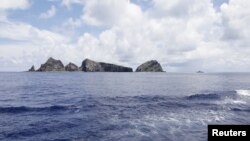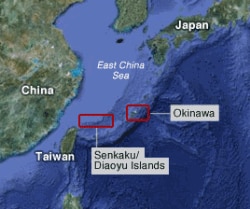A territorial dispute between China and Japan intensified Tuesday, with Beijing sending two patrol ships to "assert its sovereignty" over a group of disputed islands, even as Tokyo was finalizing a deal to purchase them.
China's official Xinhua news agency said the China Marine Surveillance (CMS) ships arrived near the islands early Tuesday. It said the CMS, a paramilitary law enforcement agency, has drawn up a plan to safeguard the islands, but did not elaborate.
Meanwhile, Japanese media said Tokyo has signed a contract to purchase three of the largely uninhabited islands from their private Japanese owner for $26 million. China does not recognize the landowner and has repeatedly warned against the deal.
The islets, known in China as Diaoyu and in Japan as Senkaku, lie near strategic shipping and fishing grounds, as well as potential oil and gas reserves.
In announcing the deal, Japanese Cabinet Secretary Osamu Fujimura said the decision to buy the islands was not meant to anger China, but to create a "stable and secure environment."
But Beijing responded angrily, warning of "serious" but unspecified repercussions. Foreign Ministry spokesperson Hong Lei on Tuesday echoed President Hu Jintao's warning against the purchase, which he called "illegal."
"We hope that Japan will change its erroneous decision and stop any actions that hurt China's sovereignty," said Hong. "China will take necessary measures to resolutely protect the country's sovereignty according to developments in the situation."
Hong also said the purchase has aroused "extreme indignation" among Chinese citizens, many of whom posted angry anti-Japan comments on the country's microblogs on Tuesday. A series of small anti-Japan protests were also reported at various locations across China.
Independent China analyst Bill Bishop says the island dispute is the number one topic on China's Twitter-like Sina Weibo microblog. But while he says the government has allowed the rhetoric to get "pretty vitriolic," it is unlikely to let the protests escalate.
"Given the current political environment, I don't imagine the government has any interest in seeing it get too out of control, because there are lots of other issues that people are upset with, such as inflation and the economy," said Bishop. "So having lots of people on the streets could get a bit dangerous."
The islands have a long history of stoking nationalist tensions and damaging relations between Asia's two largest economies. But the dispute heated up in recent months as Japanese and Chinese nationalists sailed to the islands and swam ashore to assert their countries' claims, prompting the two governments to accuse each other of provocation.
Some say that Japan's purchase of the island was partly prompted by Tokyo's outspoken nationalist governor Shintaro Ishihara, who threatened earlier this year to purchase the islands because he said Japan was not doing enough to protect them from Chinese claims.
China's official Xinhua news agency said the China Marine Surveillance (CMS) ships arrived near the islands early Tuesday. It said the CMS, a paramilitary law enforcement agency, has drawn up a plan to safeguard the islands, but did not elaborate.
Meanwhile, Japanese media said Tokyo has signed a contract to purchase three of the largely uninhabited islands from their private Japanese owner for $26 million. China does not recognize the landowner and has repeatedly warned against the deal.
The islets, known in China as Diaoyu and in Japan as Senkaku, lie near strategic shipping and fishing grounds, as well as potential oil and gas reserves.
In announcing the deal, Japanese Cabinet Secretary Osamu Fujimura said the decision to buy the islands was not meant to anger China, but to create a "stable and secure environment."
But Beijing responded angrily, warning of "serious" but unspecified repercussions. Foreign Ministry spokesperson Hong Lei on Tuesday echoed President Hu Jintao's warning against the purchase, which he called "illegal."
"We hope that Japan will change its erroneous decision and stop any actions that hurt China's sovereignty," said Hong. "China will take necessary measures to resolutely protect the country's sovereignty according to developments in the situation."
Hong also said the purchase has aroused "extreme indignation" among Chinese citizens, many of whom posted angry anti-Japan comments on the country's microblogs on Tuesday. A series of small anti-Japan protests were also reported at various locations across China.
Independent China analyst Bill Bishop says the island dispute is the number one topic on China's Twitter-like Sina Weibo microblog. But while he says the government has allowed the rhetoric to get "pretty vitriolic," it is unlikely to let the protests escalate.
"Given the current political environment, I don't imagine the government has any interest in seeing it get too out of control, because there are lots of other issues that people are upset with, such as inflation and the economy," said Bishop. "So having lots of people on the streets could get a bit dangerous."
The islands have a long history of stoking nationalist tensions and damaging relations between Asia's two largest economies. But the dispute heated up in recent months as Japanese and Chinese nationalists sailed to the islands and swam ashore to assert their countries' claims, prompting the two governments to accuse each other of provocation.
Some say that Japan's purchase of the island was partly prompted by Tokyo's outspoken nationalist governor Shintaro Ishihara, who threatened earlier this year to purchase the islands because he said Japan was not doing enough to protect them from Chinese claims.





